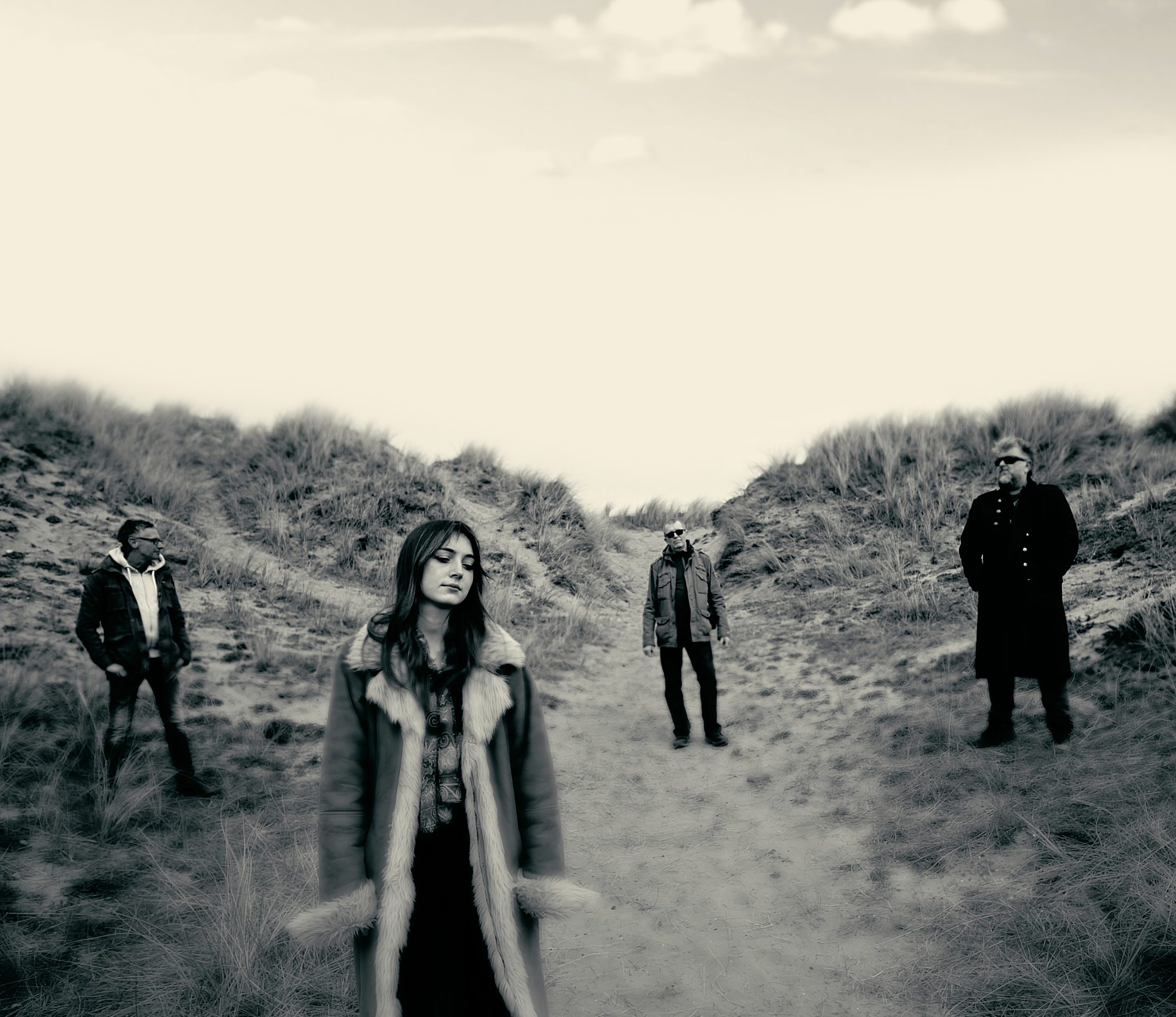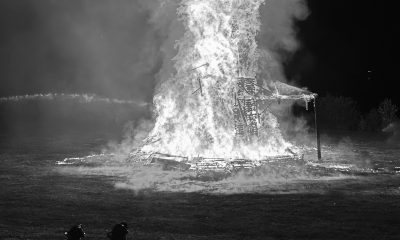Album Review
NEEB drops a creative renaissance with its soulful summer masterpiece, “Take To The Sky”

NEEB is a band hitting its creative stride with an exhilarating vibe that thrives on collaboration and innovation, as evidenced by its latest single, “Take To The Sky.” The magic is an intoxicating blend of soulful jazz and chilled summer grooves, offering listeners a serene musical journey. The song, released under Shy Bairn Records, marks a significant milestone for the band, showcasing the sultry percussive genius of Martin Ditcham, a renowned songwriter known for his work with ‘Talk Talk,’ who joined forces with NEEB after a serendipitous encounter with their legendary drummer in London.
The most striking feature of this track is undoubtedly Jasmine Weatherill’s mesmerizing vocal performance. Initially a guest artist, Jasmine has seamlessly transitioned to a fully-fledged integral part of NEEB, and her growth within the band is evident. Her smooth, alluring vocals add an unmistakable layer of finesse to NEEB’s already rich instrumentation, blending seamlessly with the band’s delightful signature mix of funky basslines, intoxicating rhythms, Rhodes piano, synths, and drones.
The lush harmonies and overall charm of “Take To The Sky” lay the rhythmic groundwork for NEEB’s creative synergy. The ensemble musicianship of the band’s members, Tony Waite, Mark Lloyd, Jasmine Weatherill, and Mark Hand, are evidently in full creative mode, bouncing ideas and feeding off each other’s enthusiasm. The outcome underscores a fresh and profoundly engaging auditory experience that flawlessly embodies their musical evolution and dynamic vitality. It demonstrates the finest guitar proficiency, beckoning listeners to unwind and savor the relish moment of a sun-drenched day infused with a tranquil ambiance.
Having performed alongside renowned artists like Pee Wee Ellis, Gong, and Alabama 3 and gracing major festival stages, including Glastonbury and Freerotation, NEEB is no stranger to captivating audiences. With the release of “Take To The Sky,” they continue to push their creative boundaries, setting high expectations for their upcoming album. This single sets a promising precedent that particularly appeals to jazz fans with a soulful, summer-infused groove.
CLICK HERE TO STREAM NEEB’s “Take To The Sky“ on Spotify.
CONNECT WITH NEEB | Facebook |
Album Review
Saint Escape sets the past on fire with latest release “Look At What You Made”

Saint Escape isn’t here to reconcile the past, they’re here to torch it. Now, with the release of their new single “Look At What You Made,” Saint Escape have unleashed a punishing, nu-metal-infused anthem that just sounds like an equal measure of reckoning and release. It is loud, confrontational, and honest, exactly what a purging rock record should be.
Produced and mixed by Joe Rickard, Starset, Three Days Grace, Breaking Benjamin, the track delivers a tight punch that fuses wild aggression and arena-sized power. “Look At What You Made” doesn’t stop. Rickard’s slick production redoubles Saint Escape’s raw edge rather than sanding it down, and the song takes on a huge, modern rock sound without losing its bite.
“Look At What You Made” is a primal response to toxic authority figures, the kind who kept order through fear, misinformation, and control, and knew where best to leave emotional scars. On “Look At What You Made,” the anger boiling beneath the surface becomes something purposeful, an anthem for anyone who’s been moulded by manipulation and left in its wake. The effect is communal shake-off, a determination not to be shaped by the past.
And lead vocalist Matt Cox provides a threatening, buffed clean vocal performance, of sorts as well, one that’s heavy with anger and determination. There is rage here, but also clarity, a sense that this is less about revenge than about reclaiming autonomy. As Cox puts it, the song is a purge, a reminder that the future belongs to those willing to to take it back. “Look At What You Made” is a testament to strength and newfound independence, it’s further evidence that Saint Escape are bleeding their past into something louder, stranger, and harder to ignore.
Album Review
Big O redefines artistic evolution with “When it’s Not Said, But Done” album

Big O’s “When it’s Not Said, But Done” is a whisper of transformation narrated through rhythm, texture, and space. Across its fifteen tracks, spanning just under forty-seven minutes, Big O sacrifices flash for feeling and ego for essence.
The production feels like an artist who has finally quit chasing something external and is instead listening inward. The flow of the album is methodical but organic, with each track leading into the other as if they were diary entries. On “Free Spirit,” Big O creates a soundscape that embodies freedom in action, with rhythms that propel you forward. It’s one of those rare songs that can be at once contemplative and propulsive, with a slow revelation. And also, “New Found Joy” is an anthem for rebirth.
Big O’s production vision here is sweeping and cinematic, but also intimate. The presence of live musicians gives an organic texture. Jeronimo G’s xylophone on track nine tolls like an intimate conversation, while IB Delight’s saxophone on track ten blows satisfying warmth and longing into the mix. These collaborative moments are the crucial parts of Big O’s unfolding language.
Every choice, from the minimal artwork by Andriyan Robby to the in-house mixing and mastering by Big O himself, is consistent with the album’s spirit of transformational thought. In “When it’s Not Said, But Done,” Big O has created a statement on silent courage. It is an album for those who know that, in reality, real change does not need to be shouted from the mountaintops, but only heard, felt, and lived.
-

 Artist Spotlight4 days ago
Artist Spotlight4 days agoGOODTWIN shares reflection with indie-pop single, “Soak It Up”
-

 Artist Spotlight2 days ago
Artist Spotlight2 days agoSAMSARA transforms quiet heartbreak into a modern rock journey on latest release “mrs. porter”
-

 Artist Spotlight2 days ago
Artist Spotlight2 days agoTom Woodward exposes the dark side of modern idol worship in latest release “PHONEY MESSIAH”
-

 Artist Spotlight2 days ago
Artist Spotlight2 days agoMORPHEUS VON DOBENHAUSEN lets go of the chaos, dancing steady soft and slow in latest release “GOODBYE CHAOS”
-

 Artist Spotlight2 days ago
Artist Spotlight2 days agoSavvie steps out with an anthem of power and perseverance on latest release “Incredible”
-

 Artist Spotlight2 days ago
Artist Spotlight2 days agoSkillMusicsa speaks in silence when love fades with latest release “How Could You”
-

 Artist Spotlight2 days ago
Artist Spotlight2 days agoMarcello Cordova turns loss into light on latest release “Jan 3rd (I Wish We Would Have Had More Time)”
-

 Artist Spotlight2 days ago
Artist Spotlight2 days agoNeural Pantheon unveils a dark folk parable, when gold outweighs the soul on “The Merchant’s Last Coin”













